 |
 |
 |
|
 |
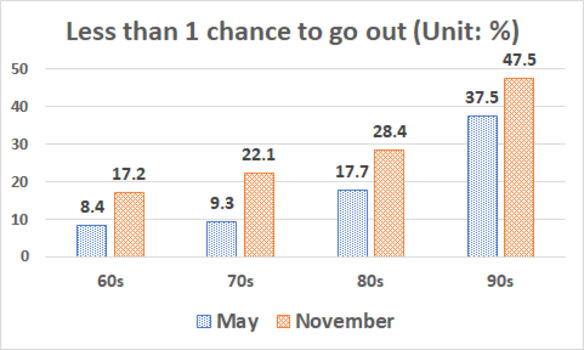 Go out once a week or less (Graph 1) |
|
60 generations May...8.4% → November...17.2% Generation 70 May...9.3% → November...22.1% Generation 80 May...17.7% → November...28.4% Generation 90 May...37.5% → November...47.5% We found that the tendency to stay home has increased by about 10% in all age groups from 60s to 90s. "Forgetfulness is also on the rise. |
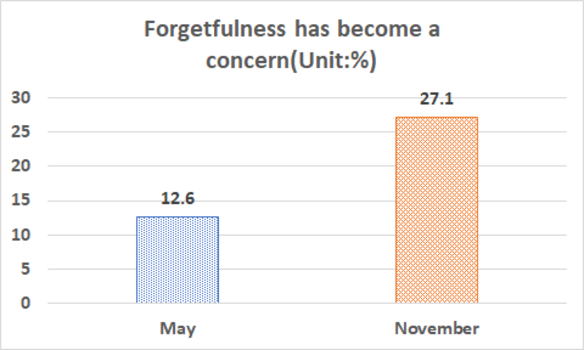 Forgetfulness has become a concern (Graph 2) |
|
The percentage of people in their 60s and over who say they have started
to hear the same thing over and over again or worry about forgetting things. May...12.6% → November...27.1% The number of people who had become forgetful was more than doubled. |
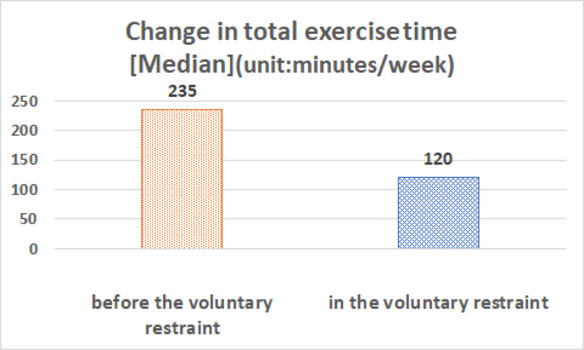 Change in total exercise time (Graph 3) |
| Before the self-restraint, it was 235 minutes per week, while during the self-restraint it was 120 minutes per week, a decrease of 115 minutes. |
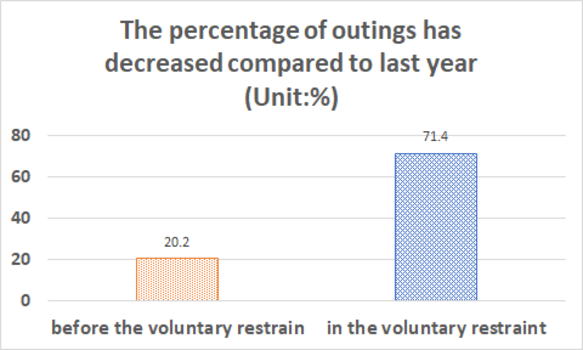 Those who went out less frequently than last year (Graph 4) |
| Before the self-restraint, the rate was 20.2%, while during the self-restraint, the rate was 71.4%, an increase of 51.2%. |
 What changes have you felt in your physical condition? (Graph 5) |
| We have found that there are many people who feel a change in their physical condition. |
| Survey method, timing, and number of data Graphs 1 and 2: The graphs were created by referring to the results of a survey published by a research group at the graduate school of Tsukuba University on March 23.The research group conducted a questionnaire survey of about 600 people in Mitsuke City, Niigata Prefecture in May last year to find out the health status of elderly people with coronary heart disease, and conducted a similar survey in six municipalities across Japan in November last year, six months after the infection was spreading again. The sample size was different, but they compared the trends. Graphs 3 and 4: These graphs were created by referring to the results of a survey on exercise and lifestyle habits in the Tokyo Health Co-op's Corona disaster Tokyo Healthcare Co-op conducted a survey on exercise and lifestyle habits during the corona disaster among 213 elderly members living in the area. Graph 5: The graph was created by referring to data from the Asahi Shimbun Re Life Readers' Conference (Corona disaster health questionnaire). This survey was conducted between December 2020 and January 2021 and 255 people responded. |
| Changes before and after the outbreak of the new coronavirus infection and after the declaration of the second state of emergency (after July 2020) From survey data by the University of Tokyo's Research Institute of Gerontology (from Chunichi Shimbun) |
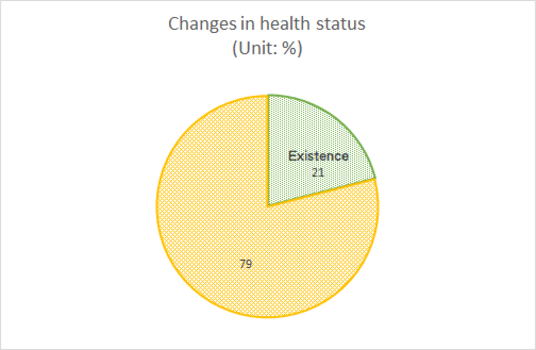 |
| Why the change in health status? I don't leave the house much anymore and I've gained weight. He doesn't talk to people, so he's slow to move. I'm not going out as much and I'm losing muscle strength. My internal organs have been deteriorating and I've been eating less and less. I get tired easily and my legs feel weak when I walk. |
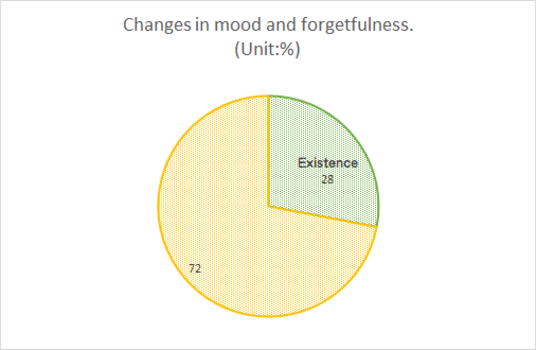 |
| Why the change in feelings and forgetfulness? Depressed by the fear of infection and not being able to go out I can't wait to clean and prepare food. I'm stressed out and can't sleep. I'm less energetic than before. Forgetting what I was told, forgetting things more often. I was a positive person, but I became a worrier. |
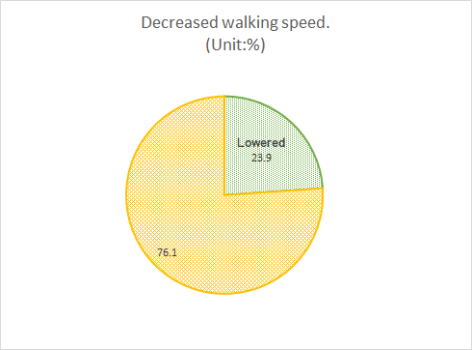 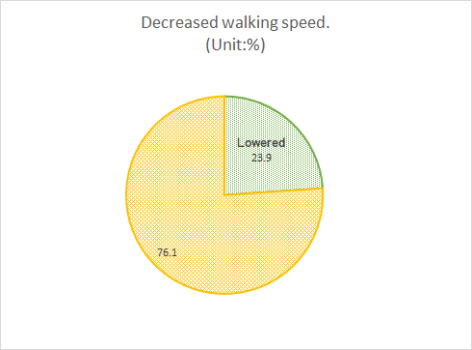 |
| Survey method, timing, and number of data. The graphs of changes in health status and changes in feelings and forgetfulness are based on survey data from the University of Tokyo's Research Organization for the Aging Society. The survey was conducted by telephone among 134 participants of the Hiratsuka City Flail Check and 500 people (65-98 years old, 31% male, 69% female) at Hiratsuka City Gathering Place. The graphs showing a decrease in walking speed and a decrease in muscle mass were created based on data from a survey conducted by the University of Tokyo's Research Institute of Gerontology. The survey method was based on data from the Kanagawa Prefecture Hiratsuka City Flail Check. The method of the survey was to compare the data of 134 participants of the Hiratsuka City Flail Check with the results of the Flail Check before Corona and the results of the telephone interview at the Corona disaster (July-August 2020).Muscle mass was assessed by the "finger ring test" and walking speed was assessed by the "eleven check". |
The number of minutes of physical activity per week among the elderly in Japan has decreased by about 60 minutes (about 30%) before and after the spread of the new coronavirus infection. Only half of the elderly are consciously exercising even in the midst of self-restraint. The exercise I do is mostly walking and light exercise in my home, both of which I do alone. It is feared that if people continue to live in a state of reduced physical activity without exercising, the number of people who require nursing care will increase rapidly after the new coronavirus infection is under control. We have collected data from municipalities across the country for the past year, and have found scientific evidence that the elderly are suffering from a marked decline in physical and mental functions based on inactivity due to prolonged self-restraint, a condition that can be called "Corona Fail. In the first six months alone, more than 40% of the elderly showed a marked decrease in the frequency of going out (14% of the elderly went out only once a week), as well as an increasein eating disorder, a loss of connection with others, and decreased community interaction. The loss of muscle mass in the whole body can also be confirmed by comparing before and after, and the loss in the trunk is particularly noticeable. In addition, there is a decrease in grip strength, a decrease in calf circumference, and a decrease in glide. |